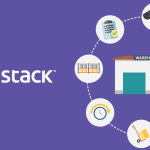
Online sales in the US will reach nearly half a trillion dollars in 2017. That figure is double the amount of just five years ago and close to 10% of total sales in the US economy.
Add to that a burgeoning global marketplace and the future holds tremendous income opportunity for online sellers.
At the same time, the massive growth in sales has created a growing list of potential headaches in terms of inventory management.
The days of relying on rough estimates or hand counts of inventory are over.
Instead, online sellers who want to stay in business need access to inventory management systems designed for today’s complex online marketplace.
Sellercloud is a cloud-based software company that provides a single-source management solution for online sellers.
Recently, the company developed a revolutionary new inventory tracking system, Skustack, which promises to radically change the way online sellers manage their warehouse inventory.
We sat down with Sellercloud CEO Jeremy Greenberg to learn more about this new mobile app and the benefits it offers to online sellers in an increasingly competitive market.
RC: Tell us about Skustack and why you believe online sellers need to incorporate this app into their business?
JG: Skustack is a downloadable app that allows online sellers to track all inventory movements in real time. This includes the entire selling cycle of the product, from the time it reaches the warehouse to the time it is shipped to the customer. It also includes tracking items that are returned to the warehouse. Any changes in a product’s status are immediately communicated to Sellercloud’s software.
RC: What other benefits does Skustack offer?
JG: Mobility is another important benefit associated with Skustack. Essentially, it can be used on any android-compatible smart phone.
RC: How might this work in a typical warehouse situation?
JG: Every warehouse operates according to its own needs and standards, but there are common challenges faced by most online sellers. Older warehouse management systems lack the capacity for detailed reporting found with Skustack. This opens the door to inaccurate reports. For example, a seller may receive a purchase record for 75 units of a product, but the follow-up report shows 78 units sold. When an operation is small, a certain range of inaccuracy is expected. However, one a seller reaches a certain level of inventory, accurate inventory counts become vitally necessary. The lack of an up-to-date, detailed inventory management system can create huge disruptions, which in turn cannot be fixed without allocating hundreds of man-hours to manually track inventory.
RC: Hasn’t this always been a problem? Why is warehouse management a bigger problem today than it was several years ago?
JG: The sheer size of the online market means that the sales cycle is much more complex than it was just a few years ago. This is especially true when you add mobile technology into the mix. Everything in the sales cycle happens at a much faster pace as well. This means that items might be purchased, shipped and, in some cases returned due to defects, without any way to track them in the inventory.
RC: What are the long-term effects of not having a precise inventory tracking system of the kind Skustack provides?
JG: As companies grow, outside parties begin to have a greater voice in operations. For example, if a seller is seeking financing from a bank or needs insurance, inventory tracking becomes much more important. If a business claims to have $1 million inventory, that has to be accurate. Commissions and taxes are other areas where precise reporting is absolutely necessary. The only way to achieve this kind of precision is to have immediate knowledge of the status of every product. This is one of the key features Skustack offers.
RC: Besides mobility, in what ways is Skustack different than QuickBooks or similar off-the-shelf programs?
JC: QuickBooks was not designed as inventory software. Some sellers might attempt to improvise a number of solutions, but they are destined to fail. The reason for this is that QuickBooks is made for linear transactions, where there is a clear flow of items coming in and going out. Other programs are designed to help sell products, rather than track inventory. Online selling no longer follows a straight line like that. Instead, they need to be able to maximize their sales by selling whatever they can get their hands on, without waiting for the item to first go on a shelf in their warehouse. Those types of software programs may be able to tell a seller the number of units available to sell, but not the physical inventory in the warehouse. Tracking damage and quality control issues is difficult with other programs.
RC: When did you first become of aware of the need for a product like Skustack?
JG: As with many developments in the software world, necessity is the mother of invention. Some of our customers have begun to see some pretty sophisticated stolen goods operations crop up among their employees. Without a way to track inventory in real time, i.e. a direct link between warehouses and the business office, it can take a couple of months before management becomes aware that items are being stolen. For some businesses, this can translate into hundreds of thousands of dollars in losses before any red flags are raised.
After one particularly damaging episode, one of our customers asked us if we could create a simple app that would allow him to scan the tracking numbers of packages leaving their warehouse to make sure that they related back to actual customer orders. He needed something that could be used as a hand-held mobile app in the warehouse and which could transmit data to the main offices in real time.
RC: Prior to Skustack, did you have experience in creating mobile applications? How were you able to accomplish this?
JG: It is true that nothing like this had ever been done prior to our attempts. Personally, the project was initially challenging, because our experience is with .net programming. Creating a native android app meant learning the language of mobile development. Eventually, we were able to create a prototype that allowed a customer to verify when a product was shipped out of a facility. At this point, we have a number of clients using Skustack to manage their warehouses, and the feedback is that they are getting a lot of value from it.
RC: What are some other benefits sellers can gain by incorporating Skustack into their warehouse operations?
JG: The key advantage of Skustack is that it is a simple mobile app, which means anyone who knows how to use a smartphone can learn to use it in a few minutes. This makes Skustack much less expensive to deploy than older, more labor intensive systems. The beauty of Skustack is that the entire inventory can be monitored with inexpensive Android tablets, like a $20 Trac phone. One of our clients has a staff of 22 people. Typically, the handheld devices that you would see used in Wal-Mart or CVS Pharmacy would be made by Motorola or Honeywell and cost between $1000 – $2000 each. Now all he needs is the Skustack application and 22 inexpensive Trac phones.
RC: Where do you see the Skustack technology going in the next few years?
JG: Skustack really should be seen as a disruptive technology with the potential to impact every aspect of the online selling industry. We are constantly making improvements and upgrades, which are immediately integrated into our customers’ app. We also have excellent relationships with our customers, whose feedback helps us provide field-tested solutions.
The reality of online selling is that as long as there are products, sellers will need warehouses to store those products. And as long as there are warehouses, there will be a need for the kind of inventory management provide by Skustack. My hope is that Skustack eventually becomes an industry standard for online sellers.
RC: Thank you for taking time to speak with us today.
JG: You’re welcome.
Schedule a Skustack demo today.




